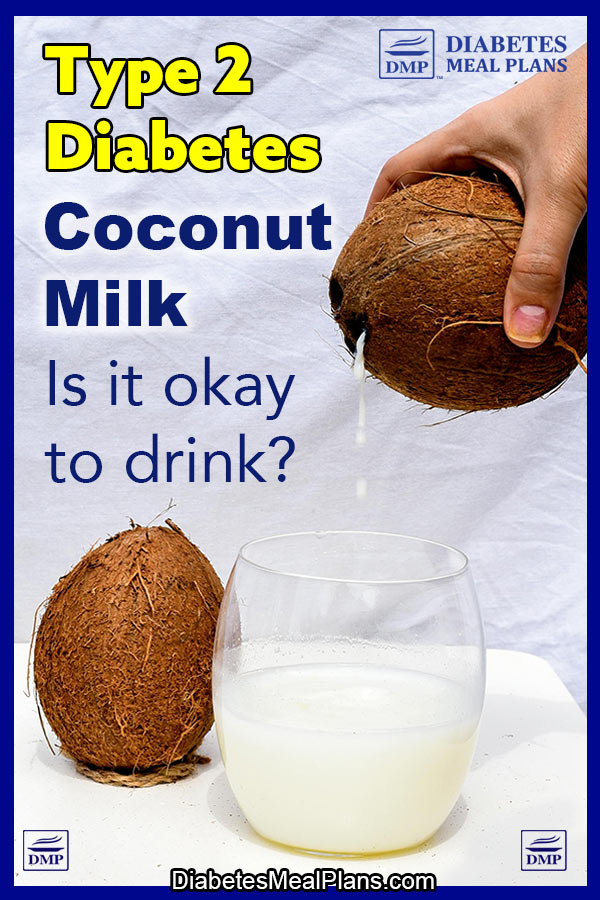When it comes to milk and diabetes, there are several good options and coconut milk happens to be one of the milks you can happily enjoy!
Coconut milk has a unique, rich flavor and a nutritional profile that provides several health benefits, as it contains Medium-Chain Triglycerides (MCTs) that can help improve glucose metabolism, insulin sensitivity and aide in weight management.
Let’s delve into the potential benefits of incorporating coconut milk into your diabetes-friendly diet.
Coconut Milk Nutrition Overview
Coconut milk, derived from the flesh of mature coconuts, is lauded for its creamy texture and tropical flavor. It’s a staple in many cuisines around the world, particularly in Southeast Asia, India, and the Caribbean.
Nutritionally, coconut milk is distinct from cow’s milk and other plant-based alternatives. It is high in calories and saturated fats (*a good kind*) but lacks carbohydrates, making it a suitable option for a diabetes low carbohydrate diet, which has been proven to be the most beneficial eating plan for type 2 diabetes and prediabetes.
A one cup serving of coconut milk can vary quite a lot in terms of nutrition, depending on the brand and type of milk.
For example, a one cup serving of unsweetened Vita Coco Coconut Milk contains:
- Calories: 50
- Fat: 3g
- Saturated Fat: 2.5g
- Carbohydrates: 5g
- Fiber: 0g
- Sugars: 3g
- Added sugars 0g
- Protein: 0g
A one cup serving of unsweetened canned coconut milk, such as this Thai Kitchen brand, contains:
- Calories: 420
- Fat: 42g
- Saturated Fat: 36g
- Carbohydrates: 9g
- Fiber: 0g
- Sugars: 3g
- Added sugars 0g
- Protein: 0g
The canned milks do tend to be thicker and richer, containing more coconut than water, which explains the higher values when it comes to their nutritional content.
Benefits of Coconut Milk for Diabetes Management
- Low Carbohydrate Content: Keeping carbohydrate intake in check is the key to managing blood sugar levels, and coconut milk is a suitable option. Containing only 5-9g of carbs per one cup serve, this minimizes the risk of blood sugar spikes, which is crucial for maintaining healthy blood sugar levels.
- Medium-Chain Triglycerides (MCTs): Coconut milk is rich in medium-chain triglycerides, a type of saturated fat that has been shown to have several health benefits. Research indicates that MCTs can help in weight loss, improve insulin sensitivity, and enhance glucose metabolism.
- Satiety and Weight Management: The high fat content in coconut milk is very satisfying, increasing feelings of fullness (satiety), which may help with appetite control and weight management.

Research on Coconut-Based Products
There aren’t any specific studies on coconut milk in diabetes, but there are some studies on the benefits of the Medium-Chain Triglycerides (MCTs) that coconut contains.
- Research explored how replacing dietary fats with MCTs affects insulin-mediated glucose metabolism in subjects with non-insulin-dependent diabetes mellitus (NIDDM). The findings suggest that dietary MCT may enhance insulin sensitivity and glucose metabolism, indicating potential benefits for diabetes management.
- A pilot study assessing MCT’s efficacy for weight management in moderately overweight people with type 2 diabetes, found that MCT might be useful for body fat management.
- Despite its high saturated fat content, coconut oil has been shown effective at reducing LDL, total cholesterol and triglycerides, while increasing (the ‘good’) HDL. It has antioxidant and anti-inflammatory benefits, and is effective at killing pathogenic bacteria, yeasts and fungi.
These studies collectively suggest that MCTs, including those found in coconut milk, may have positive effects on metabolism, insulin sensitivity, glucose management, lipids and inflammation, which are all crucial aspects of optimal diabetes health.
Coconut Milk Considerations and Recommendations
While coconut milk can fit into a diabetes-friendly diet, there are a few considerations to keep in mind:
- Portion Control: Coconut milk is high in saturated fats, and although we’ve just established that it contains a positive type of fat (MCTs), it’s still advisable not to overdo your intake. Given its high calorie and fat content, portion control is important when including coconut milk in your diet.
- Product Selection: Be mindful of added sugars and preservatives in some commercial coconut milk products. Reading labels and choosing unsweetened, pure coconut milk can help avoid unnecessary carbohydrate intake.
Incorporating Coconut Milk into Your Diet
Coconut milk can be a versatile addition to a diabetic diet.
Here are some ideas:
- Use it in smoothies for sweetness and body.
- Add as a sugar free creamer to your morning coffee.
- Incorporate it into soups and curries for richness.
- Add to a satay sauce to make your meal deliciously creamy.
- Opt for coconut milk yogurt as a dairy-free alternative.
Conclusion on Coconut Milk for Diabetics
As a diabetic, coconut milk offers a unique combination of flavor and nutritional benefits that can complement a well-rounded diabetes diet.
Its low carbohydrate content and potential benefits for glucose metabolism, weight management and insulin sensitivity make it a milk option worth considering.
However, it’s essential to balance these benefits with mindful consumption, especially regarding its higher fat content and calorie density.
Add coconut milk to a variety of beverages or meals to add natural sweetness, flavor and body – enjoy!
Curious about other foods to include in your diet? Grab a free copy of our recommended food list.

Leave a Reply